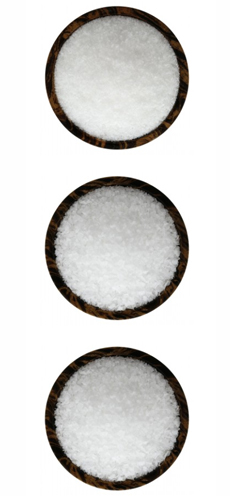
While salt can be ground into fine, medium or coarse textures, table salt (top) is always a fine grain, kosher salt (center) a coarser, flat grain, and sea salt anything from finely ground to naturally extra-coarse (bottom photo shows medium-coarse). Photo courtesy Saltworks.us. |
|
Certain recipes specify kosher salt or sea salt instead of table salt. What if you don’t have any? Isn’t all salt the same?
Yes and no. All salt is virtually 100%* sodium chloride (NaCl), so in this sense they are the same. Table salt and kosher salt come from salt mines. The salt was deposited when ancient seas dried out, leaving behind the salt that had been dissolved in the water. After mining, the salt is refined and ground to size, with anti-clumping additives added to table salt.
Sea salt is evaporated from sea water. Each body of water contains different levels of trace elements, so the salts are different from each other and from mined salts.
And, each type of salt has a different level of saltiness, so they are not interchangeable in recipes. Recipes developed with one type of salt need to be adjusted if another type is used.
Table salt is mined, refined and ground finely, to fit into salt shakers. It dissolves a bit more quickly in liquid, and sticks better to food when sprinkled on top. Look at it under a microscope and you’ll see tiny, even cubes, shaped to enable the grains to pack together tightly. Table salt has Table salt has a sharper, more chemical flavor, than kosher and sea salts. It is the least expensive salt.
Kosher salt is a coarse-grained salt. Grains of mined salt have been compressed, creating a flatter flake that cannot be tightly packed. Different companies produce different size grains; for example, Morton’s Kosher salt flakes are smaller than Diamond kosher salt. Kosher salt is more expensive than table salt, but still affordable for everyday use.
While all salt is kosher, the product got its name from the practice of koshering meat. Salt with a coarse and rough surface adheres to the meat easily, enabling the blood within to be drawn out (this, plus killing technique, makes it kosher).
Kosher salt is saltier than table salt and it dissolves more easily on a food (when seasoning a protein); thus many chefs prefer it. Its larger, visible flakes also make good toppers for food like pretzels; and its adhering qualities make good salt crusts on fish and rims on cocktail glasses. Kosher salt is not iodized. Most kosher salt sold is not sea salt, although some specialty producers do make kosher sea salt.
|
|
Sea salt is a broad term that refers to unrefined or minimally refined salt that is naturally evaporated from a living ocean, sea or bay. It is harvested by channeling ocean water into large clay trays and allowing the sun and wind to evaporate it naturally. Sea salt contains minute amounts of trace elements*, which vary based on the particular sea water from which the salt was evaporated.
The terroir of the water also makes the crystals different in shape, size and color. Sea salt is a premium product, for its purity, texture and crunch; and is thus pricier than table and kosher salts. Some salts are quite beautiful and can be used as garnishes: black and red lava salts from Hawaii; pink Himalayan and Peruvian sea salts; pyramid-shaped Maldon and Cyprus sea salts; and long-standing favorites of French chefs, crunchy Fleur de Sel and Sel Gris (grey salt) from Brittany.
Artisan salt is a relatively new category of sea salts, which adds flavor. The salt can be smoked over wood fires or infused with “gourmet” seasonings such as fennel, saffron, thyme and truffles. Some vendors of mined salt also sell salt blended with flavors like barbecue, chipotle and mesquite.
COMPARISON BY WEIGHT†
Table Salt: mined; small-grained cubes; 10 ounces/280 grams per cup
Morton’s Kosher Salt: mined; small flakes; 8 ounces/225 grams per cup
Diamond Crystal Kosher Salt: mined; wide flakes; 5 ounces/140 grams per cup
Maldon Sea Salt (from the Maldon, England); large, flaky pyramids; 4 ounces/115 grams per cup
Fleur de Sel Sea Salt (from Brittany, France); large crystals; 8 ounces/225 grams per cup
When the different salt types are dissolved in water, they will taste identical.
THE DIFFERENCE IN USE
However, if you are measuring by volume for a recipe, the different types of salt are not interchangeable because of the difference in size. The finer the salt, the more will fit into a measure (teaspoon, cup, etc.). A measure of table salt, finely ground, will have twice the saltiness of the same measure of kosher salt.
On the other hand, fine-grained sea salt can substitute for table salt, and coarse-grained sea salt can substitute for kosher salt.
If a recipe calls for kosher salt, you need to cut the amount by half to get a similar level of saltiness. Similarly, you need about 1-1/8 to 1-1/4 teaspoons of kosher salt to substitute for table salt or fine-grain sea salt.
FOR MORE ABOUT THE DIFFERENT TYPES OF SALT—SEE OUR SALT GLOSSARY.
____________________________
*Some 85 trace minerals have been found in sea salts, depending on the water from which it was evaporated. They includeboron, bromine, copper, iodine, iron, magnesium, manganese, phosphorus, silicon and zinc, among others. Mined salt is refined and its trace minerals are removed. It is available plain or iodized, the latter to counter goiter (enlarged thyroid gland from iodine deficiency), which is easily prevented by iodine. Since table salt has additives to prevent caking, some health-conscious people prefer sea salt.
†Information from SeriousEats.com.
|


